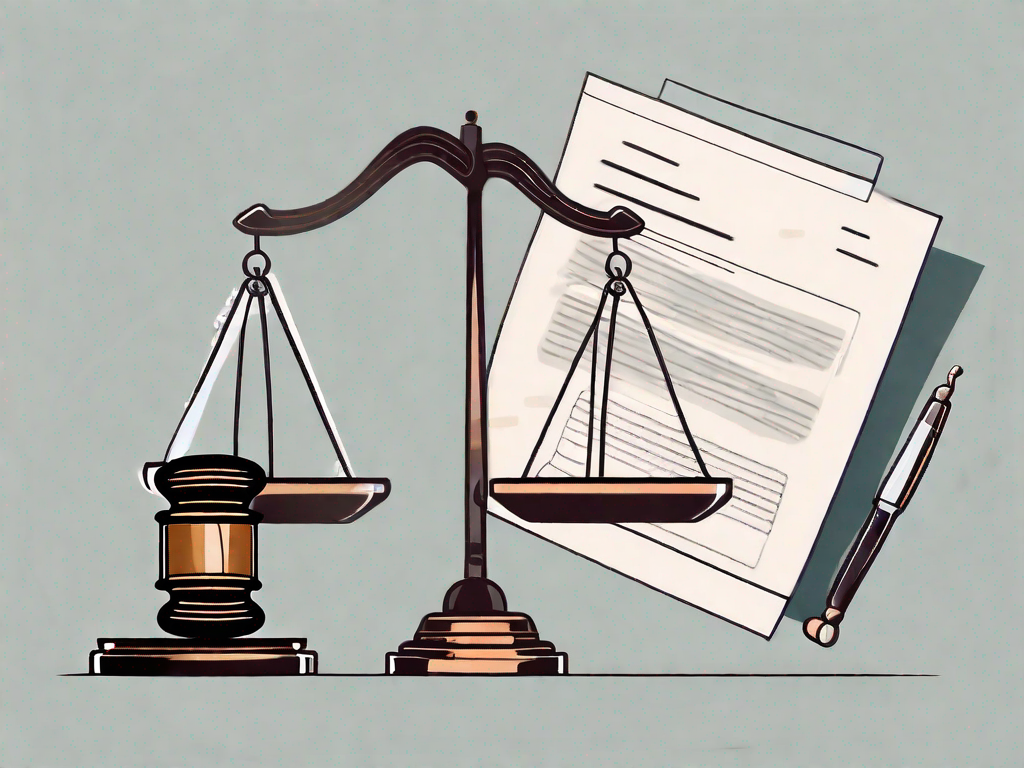
Send Us Your CV
Send us a copy of your CV and we'll see if you match any open opportunities we have.
ContentsUnderstanding Contract LawBasics of Contract LawImportance of Contract Law in Busine...

Welcome to our exploration of the world of legal and compliance careers! Within any organization, these roles serve as the backbone. Contracts play a crucial role in ensuring the smooth operation of companies and protecting the interests of parties involved. Understanding the intricacies of contract law is essential for any legal professional who wishes to excel in contract legal work. This comprehensive guide will provide you with a solid foundation in contract law, highlight the crucial elements of a legal contract, explore different types of contracts, offer practical advice on drafting contracts, and delve into breach of contract and its remedies.
Contract law serves as the foundation for all contractual agreements. It establishes the legal principles and guidelines that govern the formation, interpretation, and enforcement of contracts. Understanding the basics of contract law is paramount to navigating the intricacies of contract legal work. It is crucial to grasp concepts such as offer and acceptance, consideration, and capacity and legality.
Offer and acceptance are fundamental elements of contract law. An offer is a proposal made by one party to another, indicating a willingness to enter into a contractual agreement. Acceptance occurs when the other party agrees to the terms of the offer. This mutual agreement forms the basis of a contract.
Consideration is another important concept in contract law. It refers to something of value that is exchanged between the parties involved in the contract. This can be money, goods, services, or even a promise to do or refrain from doing something. Consideration ensures that both parties have something to gain or lose from the contract, making it legally binding.
Capacity and legality are also crucial aspects of contract law. Capacity refers to the legal ability of an individual or entity to enter into a contract. Minors, individuals lacking mental capacity, and those under the influence of drugs or alcohol may lack the capacity to form a legally binding contract. Legality, on the other hand, ensures that the contract's purpose and terms are lawful. Contracts that involve illegal activities or violate public policy are considered void and unenforceable.
Contract law plays a pivotal role in the world of business. It provides a framework for businesses to establish agreements, protect their assets, and ensure that all parties involved are held accountable for their obligations. When businesses fail to adhere to contract law, they risk financial loss, damaged reputations, and legal repercussions.
Contracts are essential for businesses to define the terms and conditions of their relationships with clients, suppliers, employees, and other stakeholders. By clearly outlining the rights and responsibilities of each party, contracts help minimize misunderstandings and disputes. They provide a sense of security and predictability, allowing businesses to operate smoothly and efficiently.
Moreover, contract law enables businesses to protect their assets and intellectual property. By including confidentiality and non-disclosure clauses in contracts, businesses can safeguard sensitive information and trade secrets. This helps maintain a competitive advantage and prevents unauthorized use or disclosure of valuable assets.
Contract law also ensures that businesses are held accountable for fulfilling their obligations. If one party fails to meet their contractual obligations, the other party can seek legal remedies, such as damages or specific performance. This promotes fairness and encourages parties to honor their commitments.
Furthermore, contract law provides a legal framework for resolving disputes. In the event of a disagreement or breach of contract, parties can turn to the legal system for resolution. This may involve mediation, arbitration, or litigation, depending on the nature and complexity of the dispute. Contract law helps maintain order and provides a mechanism for resolving conflicts in a fair and equitable manner.
A legal contract is a binding agreement between two or more parties that outlines their rights and obligations. It is crucial to understand the elements that constitute a valid contract to ensure its enforceability. Let's explore the key elements in more detail:
At the heart of any contract lies the exchange of offers and acceptance. A valid contract requires a clear and unequivocal offer made by one party, which is then accepted by the other party without any conditions or alterations. The offer must be communicated to the offeree, and the acceptance must be communicated back to the offeror. This process of offer and acceptance is often referred to as the "meeting of the minds." It is essential to establish that both parties have a mutual understanding of the terms and conditions of the contract.
For example, in a business transaction, one party may offer to sell a product at a specific price, and the other party accepts the offer by agreeing to purchase the product at that price. This exchange of offer and acceptance creates a legally binding contract.
Consideration refers to something of value exchanged between the parties involved in a contract. It is an essential element that distinguishes contracts from mere agreements. Consideration can take various forms, such as money, goods, services, or promises to act or refrain from acting. It signifies that each party is giving up something or assuming a legal obligation to receive the benefits promised by the other party.
For instance, in a contract for the sale of a car, the consideration would be the payment made by the buyer and the transfer of ownership by the seller. Without consideration, a contract may be deemed unenforceable.
In contract law, parties must have the legal capacity to enter into a contract for it to be binding. Capacity refers to the mental and legal ability of a person to understand the implications of a contract and make informed decisions. Minors, individuals under the influence of drugs or alcohol, and those with mental incapacity may lack the necessary capacity to enter into a contract.
Additionally, a valid contract must have a lawful purpose and cannot violate any statutory or common law provisions. Contracts that involve illegal activities or are against public policy are considered void and unenforceable. It is crucial to ensure that the contract's purpose is legal and does not infringe upon any legal restrictions or regulations.
For example, a contract to engage in illegal gambling activities would be considered void and unenforceable.
Understanding the elements of a legal contract is essential for anyone involved in contract legal work. By carefully considering the offer and acceptance, ensuring adequate consideration, and verifying the capacity and legality of the parties involved, one can create a solid foundation for a valid and enforceable contract.
Contracts are an essential part of any business or legal transaction. They serve as legally binding agreements between parties, outlining the rights and obligations of each party involved. There are various types of contracts, each with its own distinct characteristics and implications. Understanding these different types of contracts is crucial when analyzing contract disputes and ensuring compliance with contractual obligations.
Express contracts are those that are formally documented and contain explicit terms and conditions agreed upon by the parties involved. These contracts are often in writing and signed by all parties, clearly outlining their rights and responsibilities. Express contracts leave no room for ambiguity or misunderstanding, as the terms are explicitly stated.
On the other hand, implied contracts are created through the conduct of the parties involved, rather than through explicit written or verbal agreements. These contracts are formed when the actions or behavior of the parties demonstrate their intention to be bound by the terms of the contract. Implied contracts can arise from the circumstances surrounding the transaction or from the parties' previous dealings.
Understanding the distinction between express and implied contracts is crucial when analyzing contract disputes. While express contracts provide clear guidelines and expectations, implied contracts can be more challenging to interpret and enforce. Courts often look at the conduct and actions of the parties involved to determine the existence and terms of an implied contract.
Unilateral contracts are agreements where one party promises to do something in exchange for the other party's performance. In this type of contract, one party is obligated to act only if the other party fulfills their part of the agreement. For example, a reward offer for finding a lost item is a unilateral contract. The person who finds the item is not obligated to search for it, but if they do, they are entitled to the reward.
In contrast, bilateral contracts involve mutual promises between the parties. Both parties are obligated to perform certain actions or provide something of value. For instance, a sales contract is a bilateral contract. The buyer promises to pay a certain amount, and the seller promises to deliver the goods or services as agreed upon.
It is important to recognize the differences between unilateral and bilateral contracts to accurately interpret contractual obligations. Unilateral contracts are often used in situations where one party wants to incentivize a specific action, while bilateral contracts are more common in commercial transactions where both parties have reciprocal obligations.
Contracts play a vital role in ensuring that parties involved in a transaction are protected and that their rights and obligations are clearly defined. By understanding the various types of contracts, including express and implied contracts, as well as unilateral and bilateral contracts, individuals and businesses can navigate contractual relationships with confidence and clarity.
When drafting a legal contract, including certain essential clauses is crucial to ensure the clarity and enforceability of the agreement. These clauses may cover the scope of the agreement, payment terms, dispute resolution mechanisms, and termination clauses. Careful consideration and attention to detail in drafting these clauses can help avoid potential contract disputes and costly litigation.
Even seasoned legal professionals can fall prey to common mistakes when drafting contracts. These pitfalls include ambiguous language, incomplete or incorrect information, failure to consider the specific needs of the parties involved, and inadequate review and revision processes. Recognizing and avoiding these mistakes can save substantial time, money, and frustration.
A breach of contract occurs when one party fails to fulfill its obligations as outlined in the agreement. It can take various forms, including failure to perform, late performance, or performance that does not meet the contractual standards. Understanding the elements that constitute a breach of contract is crucial when assessing legal recourse.
When a breach of contract occurs, legal remedies may be pursued to rectify the situation and compensate the injured party. These remedies can include specific performance, monetary damages, or cancellation and restitution. It is vital to have a comprehensive understanding of the available legal remedies to effectively represent clients in breach of contract cases.
By gaining a comprehensive understanding of contract law, its essential elements, various types of contracts, drafting techniques, and breach of contract remedies, legal professionals can excel in contract legal work. With this essential guide, you are equipped with the knowledge to navigate the complexities of contract law, protect your clients' interests, and ensure the sound operation of businesses.
Ready to excel in contract legal work and become a trusted advisor in matters of contract law? Contact us now to take the next step in your legal career.